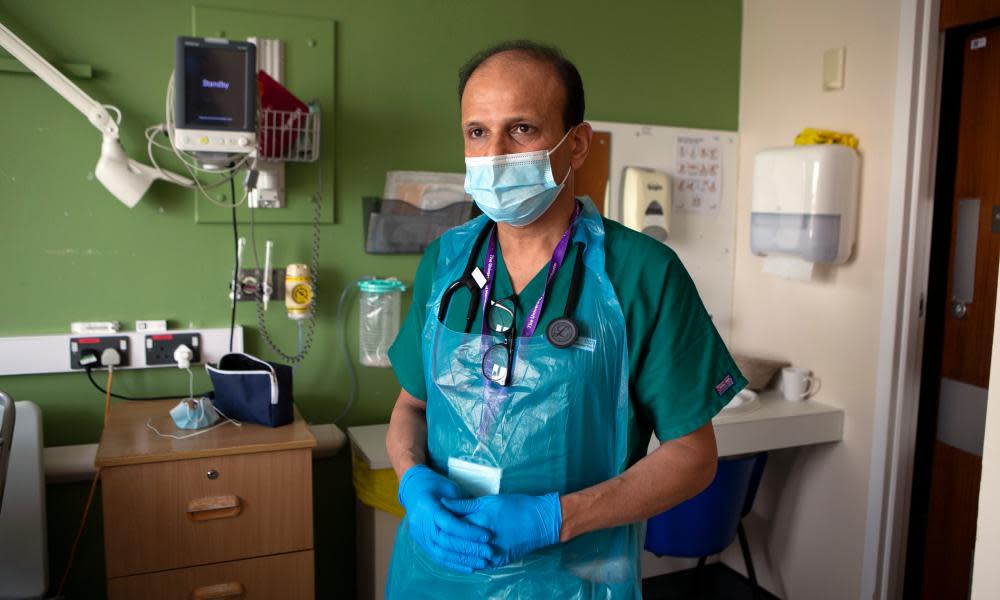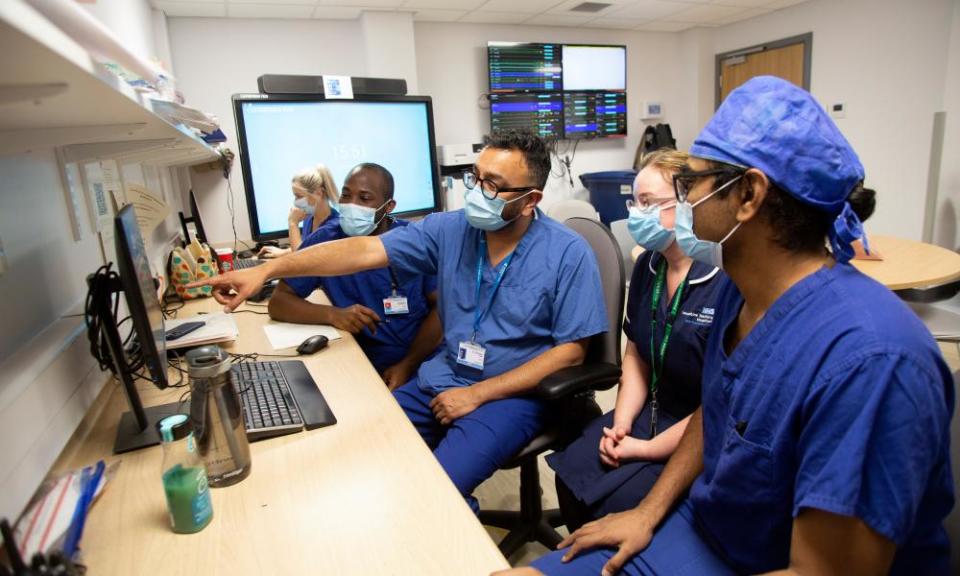‘Christmas was awful’: on the Omicron frontline at the Royal Preston hospital

After nearly two years on the Covid frontline, there is one image that haunts Prof Mohammed Munavvar. It is of a visit to Preston cemetery, where a friend had been laid to rest.
There he saw a pristine row of gravestones, each planted in the last year. They were all his patients. He knew every single name: “That was terrible, really. It was very traumatic. Even now I think about that image.”
Munavvar is a senior respiratory consultant at the Royal Preston hospital in Lancashire. He and his colleagues have treated nearly 5,000 coronavirus patients since 14 March 2020. The vast majority have survived but many have not. The hospital recorded its 904th coronavirus death overnight last week.
While ministers talk of encouraging signs that the Omicron wave may be receding in parts of England, staff at the Royal Preston are struggling to keep their heads above water.
The hospital has seen a near four-fold increase in Covid patients since Christmas Day, rising to 103 when the Guardian visited last week. It is one of the largest hospitals in a region with the highest infection levels in the UK and two neighbouring NHS Trusts have declared critical incidents. Despite a recent slowdown in admissions, the “horrendous” levels of staff absence means the pressure is ratcheting up.

“Staffing has become more of an issue this wave than it has previously,” said Dr Shondipon Laha, a consultant on the critical care ward. “Almost every day we’re struggling to make sure that staffing is provided adequately. And because our staff are incredibly conscientious, they are doing it. But you do wonder how long they can keep doing it for.”
A Nightingale field hospital is being erected in the Royal Preston car park in a sign of what is to come. One of only eight in England, the 100-bed facility will cater to the whole north-west of England and is expected to be full within weeks. The hospital’s restaurant and two sports halls are being readied as an emergency back-up.

“It does kick you in the stomach,” said Kelly Fielding, the Covid ward matron, as trolleys of lasagne, sandwiches and fruit are wheeled to the beds of its 34 patients. “You think: ‘Here we go again.’ My main fear as a manager was how are staff going to feel about it. Psychologically, are they prepared for another wave?”
A physician of 30 years’ experience, Munavvar said he and his colleagues felt like “sheep being dragged to the slaughterhouse” in the first year of the pandemic, when they were surrounded by the disease every day without the protection of the vaccine. A lasting memory is of going into work each day with a “hollow feeling that, at any time, any of us could die”, he said.
Taking shallow breaths behind his oxygen mask, Brian Swindlehurst, 75, said he had “done everything right” in trying to avoid Omicron. He wore masks in public, stayed home where possible, received the vaccine at the first opportunity. Yet Covid caught up with him in the new year, before he was able to get a booster jab due to being on medication for another condition.

Swindlehurst will stay on ward 23 for several more nights before he can return home to Christine, his wife of 54 years. A whiteboard beside his bed gives a positive two-word prognosis: “Getting better.” That is thanks to the vaccine, he says: “It could have been a different story. It saves your life.”
Nearly half of the Royal Preston’s 103 Covid patients are either unvaccinated or of unknown status – the latter usually those who are too ill to ask. About 30% are double-jabbed and 20% have had a booster jab. On the critical care ward, five of the six coronavirus patients have not had a vaccine.
Behind soundproof glass that dulls the whirr and beeps of life-saving machinery, a man in his thirties is hooked up to a ventilator, his left leg hanging limply from the side of his bed. He had not been vaccinated. “The ones who are not vaccinated are the ones who are getting extremely ill,” said Munavvar.

The success of the vaccination programme is clear in the numbers: at the height of the first wave, there were about 60 patients in the Royal Preston’s critical care unit and only the lucky made it out. Today there are six, in addition to several more recovering long-term from Covid.
Most unvaccinated patients are not “anti-vaxxer” conspiracy theorists, doctors say. They are either younger people who did not expect to get seriously ill, or those who say they simply have not got around to it. “It stresses and it saddens a lot of the staff because it’s frustrating,” said Dr Laha, an executive on the national Intensive Care Society.
default
The outcome for unvaccinated people who end up in critical care is grim, however young they are. About 30 to 40% of those on a ventilator will have a “very poor” outcome, said Dr Laha, while those who do survive will need a tracheotomy – a tube inserted into the windpipe through the front of the throat – to help them breathe.
The average stay in critical care is two weeks but the recovery time for many is measured in years, not months. As we talk, a patient on a ventilator is wheeled outside in his hospital bed for a rare breath of fresh air, nearly two months after he caught coronavirus.
Although there are far fewer patients in critical care, the level of staff absence is taking a huge toll. One in 10 of the hospital’s staff are off work, in line with the average across NHS England, but on the Covid ward about 30% of staff have been ill or isolating since Christmas Day. On some night shifts before Christmas, there were only two nurses and three healthcare assistants for 35 patients.

“The staffing pressures just before Christmas were horrendous. It was awful,” said Olivia Robinson, a 22-year-old nurse on the Covid ward. “You would be at home worried about coming in for the next shift. You’d never sleep for worrying about what you were walking into.” The stress became so great that Robinson, who qualified a year ago, left her staff job for a role that means she can choose her shifts.
The latest NHS figures suggest hospitalisations across England are stabilising, giving ministers confidence that the system will be able to cope. Suggestions that the government could lift the working from home guidance on 26 January, when the plan B legislation expires, has prompted warnings from NHS leaders against “dangerous complacency”.
Doctors at the Royal Preston expect patient numbers to rise again in the coming week due to people mixing and going on holiday around the new year. When this wave has passed, there will be no time to rest. Each of the almost 4,000 Covid patients treated by Munavvar and his colleagues need a follow-up consultation. Some will require support for years. “Where do we find the space to do that, the time to do that?” he asked.

 Yahoo Movies
Yahoo Movies 
